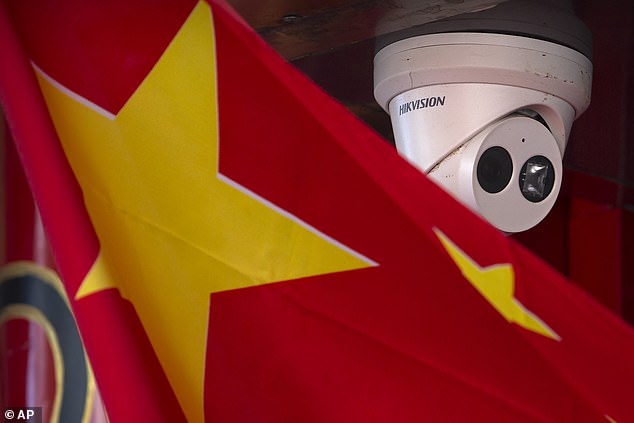China is pushing for its social credit system with a sweeping data-collection scheme to monitor and solidify control over companies, a study has said.
The Corporate Social Credit System (CSCS) would punish and reward companies by putting them on ‘blacklists’ and ‘redlists’ after compiling information and analysing their behaviour, according to a Beijing-based consulting firm.
The nationwide effort, facilitated by the ‘big data’ technology, would enhance Beijing’s ability to craft effective policy in China and other countries, said the Tuesday report.
China is ramping up its social credit system with a sweeping data-collection scheme to monitor and solidify control over companies, a study has said. This file photo shows a Chinese flag hanging near a Hikvision security camera outside of a shop in Beijing on October 8

The Corporate Social Credit System (CSCS) would punish and reward companies by putting them on ‘blacklists’ and ‘redlists’ after compiling information and analysing their behaviour. In this file photo, employees are pictured working in an office in Shanghai on August 28
Since launched in 2014, China’s social credit system has expanded into an ambitious national project backed by China’s ever-growing national surveillance network with hundreds of millions of street cameras watching citizens’ every move.
The CSCS, part of the scheme that ranks companies, uses real-time monitoring and processing systems to collect and interpret big data, according to the study by Trivium China for the U.S. China Economic & Security Review Commission.
With the nationwide data collection, the system can gather information on companies from at least 44 government agencies and their branch offices in every province across the country.
It checks and analyses a firm’s behaviour and punish those with poor records ‘by reducing their access to the market and subjecting them to public censure via ‘blacklists’,’ the report said.
Firms that are consistently compliant would be listed under ‘redlists’ rewarded with economic incentives and public praise.
The study also warned that the scale of the data aggregation scheme ‘cannot be overstated’ as the Chinese government seeks to solidify its control over domestic and foreign companies.
‘China’s push towards the rapid, large-scale consolidation of government data, of which the CSCS is a part, has the potential to enhance the bureaucratic efficiency, predictive capacity, and regulatory responsiveness of the Chinese state, which could in turn enhance Party legitimacy and control in China and in other countries,’ it said.

The nationwide effort, facilitated by the ‘big data’ technology, would enhance Beijing’s ability to craft effective policy in China and other countries, according to the report by Trivium China, a Beijing-based consulting firm. Workers are seen at the JD.com offices in Beijing on March 27
But experts have voiced concerns that the Corporate Social Credit System could be used against foreign businesses as the tensions between Beijing and Washington continued to spike.
Björn Conrad, a China specialist and CEO of the Berlin-based consultancy Sinolytics, told The Wall Street Journal that the Corporate Social Credit System would be ‘usable as a tool in the trade conflict.’
Mr. Conrad added that the language Beijing used to describe heavily distrusted entities for the social credit blacklist echoed its separate warnings about the unreliable entity list, meaning the two lists might be connected.
Though the system have sparked fears of being used as a trade war weapon, the new study claimed it did not find such evidence.

China’s ever-growing national surveillance network has an estimated of 626million street cameras watching citizens’ every move. A surveillance camera is seen outside the home of a journalist placed under quarantine after he had visited Wuhan, in Beijing on May 3

The nationwide effort, facilitated by the ‘big data’ technology, would enhance Beijing’s ability to craft effective policy in China and other countries. A passenger shows a green QR code on his phone to show his health status to security upon arrival in Wenzhou on February 28
‘There is currently no explicit reference in CSCS policy that directly disfavors foreign companies operating in China, nor is there evidence to suggest that the CSCS is being unfairly applied to foreign firms,’ the report read.
‘However, the CSCS opens up certain risks for all companies operating in China, and foreign firms may get caught in the crosshairs.’
Beijing and Washington have locked horns over issues from trade and China’s human rights record to its expansionist ambitions in the South China Sea.
As relations between the world’s two largest economies continued to nosedive, China said on Thursday it would revoke visa exemption treatment for US diplomatic passport holders visiting Hong Kong and Macau.
It came after the US on Monday imposed financial sanctions and a travel ban on 14 Chinese officials over their role in adopting a national security law for Hong Kong and over Beijing’s disqualification last month of elected opposition legislators in Hong Kong.
Beijing will also implement reciprocal sanctions against some U.S. officials, members of Congress, personnel at non-governmental organisations, and their family members, over their ‘vile’ behaviour on Hong Kong, foreign ministry spokeswoman Hua Chunying told a news conference today.
